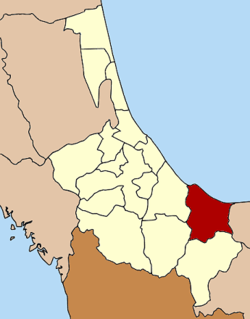Thepha District
| Thepha เทพา | |
|---|---|
| Amphoe | |
 Amphoe location in Songkhla Province | |
| Coordinates: 6°49′42″N 100°57′54″E / 6.82833°N 100.96500°ECoordinates: 6°49′42″N 100°57′54″E / 6.82833°N 100.96500°E | |
| Country | Thailand |
| Province | Songkhla |
| Area | |
| • Total | 978.0 km2 (377.6 sq mi) |
| Population (2008) | |
| • Total | 69,278 |
| • Density | 70.8/km2 (183/sq mi) |
| Time zone | ICT (UTC+7) |
| Postal code | 90150 |
| Geocode | 9005 |
Thepha (Thai: เทพา, Pattani Malay: ตีบอ) is a district (amphoe) in the southeastern part of Songkhla Province, southern Thailand.
Geography
Neighboring districts are (from the east clockwise) Nong Chik, Khok Pho of Pattani Province, Saba Yoi, Na Thawi, and Chana of Songkhla Province. To the north is the Gulf of Thailand.
Etymology
The name Thepha is a Thai language corruption of "tiba", its original name, meaning "arrive" in Malay.
History
Thepa was at first a fourth-class mueang and subordinate of mueang Phatthalung. The governor had to present a golden and silver tree to the governor of Phatthalung to pay its tribute. In the reign of King Rama II the town was transferred to Songkhla and elevated to a third-class mueang.
In 1901 as part of the thesaphiban administrative reforms the mueang was reduced to a district of Songkhla. The district office was in Ban Phra Phut (บ้านพระพุทธ), village two of Thepha subdistrict. When, in 1932, the railway was built through the district, the office was moved to a more convenient location in Ban Tha Phru (บ้านท่าพรุ), village one of Thepha subdistrict, close to the railway station, then named Tha Muang (ท่าม่วง). Subsequently the station was renamed "Thepha".
Administration
The district is divided into seven sub-districts (tambon), which are further subdivided into 65 villages (muban). Thepha is a sub-district municipality, thesaban tambon, which covers parts of tambon Thepha, Lam Phlai a sub-district municipality covering the full tambon Lam Phlai. There are further six tambon administrative organizations (TAO).
| No. | Name | Thai | Villages | Pop. |
|---|---|---|---|---|
| 1. | Thepha | เทพา | 8 | 11,667 |
| 2. | Pak Bang | ปากบาง | 8 | 8,673 |
| 3. | Ko Saba | เกาะสะบ้า | 8 | 5,310 |
| 4. | Lam Phlai | ลำไพล | 11 | 14,003 |
| 5. | Tha Muang | ท่าม่วง | 14 | 15,778 |
| 6. | Wang Yai | วังใหญ่ | 8 | 6,616 |
| 7. | Sakom | สะกอม | 8 | 7,231 |
Environment
The Pak Bang Sub-district of Thepha District is to be the site of the Electricity Generating Authority of Thailand's (EGAT) newest coal-fired generating plant, the largest of its kind in Thailand. This has raised environmental and health concerns among residents, aside from the eviction of 240 families, two mosques, two Muslim cemeteries, a religious school, and a Buddhist temple to make way for the 2,960 rai site.[1][2] A public hearing in July 2015 on EGAT's plans to build the plant was ringed with razor wire to prevent opponents of the plan from gaining access to the hearing.[3] The villagers of Pattani's Nong Chik District, who live some eight kilometres from the site, but who will also be affected by the power plant, were excluded from the hearings.[1] The latest hearing, the third and final hearing on the Environment and Health Impact Assessment (EHIA) for the 2,000–2,400 megawatt plant, was policed by 400 soldiers, police, and volunteers. Some attendees admitted being transported to the hearing by local village leaders, who also provided them with gifts and food coupons. Songkhla Governor Thamrong Charoenkul chaired the hearing despite questions raised regarding his neutrality. He told the hearing that the project will benefit Thepa residents. "Since Egat has proposed the project, Thepha is now known nationwide. Shouldn't we be proud about that?" he said. Anuchart Palakawongse Na Ayudhya, director of EGAT's Project Environment Division, insisted EGAT's hearings were lawful. "We have organised the public review step by step according to the law," he said. Anuchart said EGAT did not bar anyone from expressing their opinions. "It's impossible to cancel the project. Most Thepha people support it," he said.[4]
In August 2016, EGAT declared that construction of the plant would begin by May 2017 at the latest, in order to have it operational by April 2021, in accordance with EGAT's Power Development Plan, 2015. The major hurdle remaining is approval of the plant's EHIA for the power plant and coal transport pier. It must be vetted by the Natural Resources and Environmental Policy and Planning Office (ONEP). Two previous submissions of the EHIA were rejected by ONEP as they "needed improvement". In addition, locals claim that only 700 rai (112 hectares) of the 2,962 rai needed for the plant are state-owned. More than 240 families, or 800 people, live on adjacent plots earmarked for the plant. Most of them have refused to relocate. When EGAT hosted a meeting for landowners willing to sell their land, only some 25 persons showed up. EGAT officials maintain that 95 percent of Pak Bang Sub-district residents welcomed the project and that those opposing it were outsiders.[5]
References
- 1 2 Ashayagachat, Achara (2015-10-30). "Songkhla project puts villagers' livelihoods at risk". Bangkok Post. Retrieved 30 October 2015.
- ↑ Rujivanarom, Pratch (2016-02-16). "Coal plant in Thepa 'would inflame the insurgency'". The Nation. Retrieved 17 February 2016.
- ↑ "Razor wire rings Thepha power plant hearing". Bangkok Post. 2015-07-27. Retrieved 28 July 2015.
- ↑ Wangkiat, Paritta (2015-07-28). "Protesters shun power plant hearing". Bangkok Post. Retrieved 28 July 2015.
- ↑ Rujivanarom, Pratch (25 August 2016). "Egat insists on going ahead with Thepa plant". The Nation. Retrieved 25 August 2016.
External links
- amphoe.com (Thai)